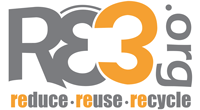
On March 23, 2009, N.C. DPPEA launched an online survey asking North Carolinians what items they believed were banned from landfill disposal in our state. This survey allowed us to track changes in knowledge about the landfill bans over time. We (along with our local government partners) conducted tons of outreach events, spoke to multiple media agencies and distributed lots of information packets during August and September of that year.
As of Feb. 12, 2010, 662 people had taken the survey. Fifty-two percent of the respondents were female and 45 percent were male (three percent did not give a gender). Most respondents (34 percent) are aged 50-64, where only nine percent were under the age of 24.
The survey asked respondents to indicate what items they believed were banned from landfill disposal in North Carolina by checking them off of a list. The list included nine items that were banned from landfills (as of Oct.1, 2009), two items that are banned in 2011 and seven items that are not banned from disposal in landfills.
| Banned from Landfills (2009) | Banned from Landfills (2011) | NOT Banned from Landfills |
| Aluminum cans | Televisions | Cardboard |
| Antifreeze | Computers (desktops and laptops) | Styrofoam |
| Appliances | | Glass bottles |
| Lead-acid batteries | | Newspaper |
| Oil filters | | Ink cartridges |
| Oyster shells | | Phone books |
| Plastic bottles | | Cell phones |
| Used oil | | |
| Wooden pallets | | |
Eighty-six percent of all respondents indicated that oil filters were banned from landfill disposal, followed by plastic bottles (82 percent) and wooden pallets (81 percent). This is not surprising, as these three items were added to the state’s banned list on Oct. 1, 2009 and there was heavy internal and external publicizing, including on the Web page that linked to the survey for citizens to take.
The three items with the fewest positive responses were newspaper (23 percent), phone books (24 percent) and Styrofoam (27 percent). Oyster shells had the fewest positive responses out of the actual banned list (51 percent) while cell phones had the highest amount of positive responses from the not banned list (also 51 percent). More people selected oil filters from being banned from landfills than did oil, which has been banned for years.

No comments:
Post a Comment